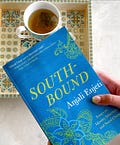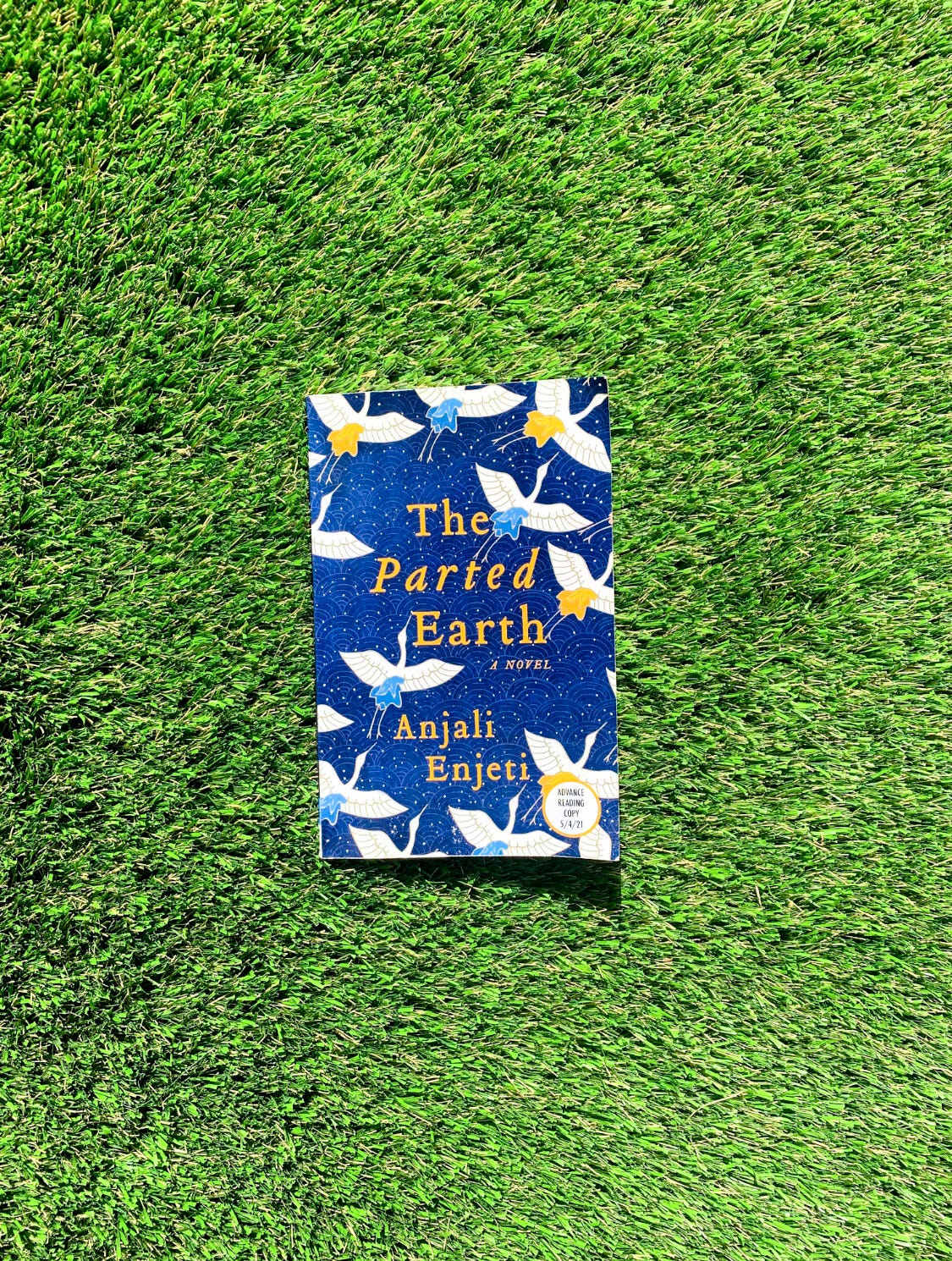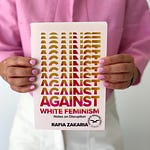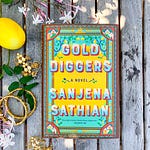Dear readers,
In this special edition of our newsletter, we interview the author of our inaugural BGB Book of the Season: "Southbound." We hope you enjoy our discussion with Anjali Enjeti. We sure did!
Until next time,
Mishika and Sri
Anjali Enjeti is an author, organizer, and award-winning journalist based near Atlanta. Her debut book "Southbound" was published on April 15, 2021, and her novel "The Parted Earth" will be published in the spring of 2021. Anjali is also the co-founder of the Georgia chapter of They See Blue, an organization for South Asian Democrats, and served on the Georgia AAPI Leadership Council for the Biden-Harris campaign.
🎧 Listen to our discussion with Anjali above.
(1:13) Which essay in “Southbound”posed the greatest challenge in distilling to fit the confines of an essay rather than a book?
The toughest essay for me to write was “In memory of Vincent Chin.” I was trying to distill the events surrounding his death in the context of anti-Asian rhetoric and violence. His murder happened when I was 8 years old, when I happened to be becoming self-aware of race and racism. It was hard to write because I didn't want the essay to be trauma porn. I don't think I'm the person to write the book about Vincent Chin; his niece is working on a book right now. But Vincent and his mother, who fought so hard for justice, were the beginnings of the Asian American movement for my generation.
(7:17) The prologue of your book is titled "What are You? Where are you From?" In what ways has writing “Southbound” helped you evolve your answer to these questions?
I did not realize that I had a lot of agency in defining my identity. It was always a third party putting me in a box, based on misconceptions and stereotypes, and I felt very suffocated by that. In the process of writing “Southbound,” I realized how I wanted to describe myself: I am a mixed-race brown woman. I am a Southerner. I am South Asian. I am Indian. Getting a chance to get that down in essays, and then pouring the various parts of my identity into activism, dismantling white supremacy, and getting out the vote for elections made me feel like I was actively taking control of my identity. Writing the book was very therapeutic for me because I was able to define myself without the white noise of everybody else trying to define me.
(10:30) In the chapter "On the Unbearable Whiteness of Southern Literature," you share, "the South has always been far more diverse than southern literature has reflected." For people of color who are not from the South, like ourselves, our perception is largely that it is White, conservative, and racist. However, you not only grew up in the South but chose to raise your family there as well. What is missing from the story; what is the South really like in terms of diversity?
There have long been South Asian communities in the American South. I grew up in Chattanooga in the 1980s, where the South Asian community was small but thriving. My father did his residency in El Paso, Texas. I think the perception is that we're not here and that the South is either a Black or a white area, but I feel like that is changing. Georgia, for example, is the 10th most diverse state in the US. While we're only still about 4.5%. Asian American, we have a lot of Black and Latinx folks, and that's how our politics were able to shift in 2020 and 2021.
I'm hoping that publishing continues to find stories of people not only from diverse racial or ethnic backgrounds but also geographic diversity. When I first started trying to find a publisher, I would get rejection letters from agents and editors that sounded like, "I'm not able to understand why this Indian family would live in Georgia." I think maybe it was harder to picture someone who looks like me living in and writing about the South because that's just not the traditional narrative of the South. But, a note of appreciation for my two Southern publishers (University of Georgia Press for “Southbound” and Hub City Press for “The Parted Earth”), who knew my narrative to be true.
(19:45) Can you share your advice for minority authors that are in the throes of writing or rewriting their book(s)?
Publishing is not necessarily a merit-based system. I received several hundred rejections over 11 years. Understand your worth as a writer lives in your writing, not your publication bylines. Keep writing for yourself and keep the business of publishing off to the side.
Find your writing community. I am here because I am friends with some amazing Black and Brown women, femme, and non-binary writers, who supported me through my darkest moments as a writer. Our communication is not even super frequent, but when I need them they are there for me, and I would not be able to keep going without them.
(24:30) You close the book discussing your work getting Asian Americans to vote in your home state of Georgia. Can you tell us more about how you got involved with this work, and how you are spending your time with community organizing and writing these days?
In 2016, when Trump won, I was absolutely stunned to hear a statistic that Asian Americans had the lowest voter turnout of any racial demographic in the US. In 2017, I started canvassing for the Democratic candidate in Georgia's 6th Congressional district election and had so many South Asian citizens tell me that they were not political. It made me realize how our community has been completely ignored by our electoral system; candidates don't come out to temples or gurdwaras as they do to churches. I canvassed at least 1,000 houses, and slowly, the same people who told me they weren't going to vote told me they already voted. It was magical to me. We lost that election, but we came very close, and once I saw that transformation I thought, "this is where I should be." My identity was actually a very positive force in getting voters to the polls. They see me, my name, and trust me more than they trust other people.
We did even better in the 2018 midterms with Stacey Abrams, and then had a phenomenal turnout for the 2020 presidential election and 2021 Senate runoff. Jon Ossoff came to an event at the Patel Brothers in Forsyth County, which is, historically, one of the most racist counties in the South, but where there is now a very large South Asian population. And that said it all. Seeing Jon Ossoff at Patel Brothers was something I could not have imagined before 2016, but we had so much success because we were AAPIs reaching out to other AAPIs.
Southbound
When we started BGB in August, we wrote the following in our introductory post: "We hope to present readers with the context they need to interact with and demand different, otherwise underrepresented, stories and storytellers." Our statement put the onus on our audience. But, truthfully, BGB presented us with the path to interact with storytellers we may not have found had we stuck with the mainstream bestsellers.
It's clear as day that Anjali Enjeti sees value in joyful and affirming Own Voices titles. Perhaps that's why she elevates so many other writers in the pages of her debut book. She recommends work that tiptoed off of her pages and into my reading list.
Enjeti represents multiple souths—South Asia, southern India, and the Deep South of the United States. She shifts from justifiably infuriated prose to heartfelt poems, first-person to third, and insights into action—all of which are influenced by a deep understanding of her identity and relationship with activism. I gathered Enjeti is a rock star from the early chapters of “Southbound.” This feeling was further cemented when Enjeti shared that her criticism of Oprah’s 1999 book club selection of “Mother of Pearl” landed her an invitation as a guest panelist on The Oprah Winfrey Show. Enjeti is, as Mikki Kendall, the author of “Hood Feminism,” would say, an "accomplice feminist." She actively challenges people, policies, institutions, and cultural norms that bring harm to Black and Brown people - both on the ground and by virtue of this book.
Order your copy of "Southbound."
The Parted Earth
“The Parted Earth” is a multi-generational epic that traces the effect of Partition, the division of colonial British India into the independent countries of India and Pakistan, on one family. It begins with a romance between two teenagers, Deepa and Amir, in 1947 Delhi. Their interfaith love story is shattered by political tension over the creation of Pakistan as a Muslim state and the resulting mob violence which wreaks havoc in their city. Decades later, Shan, an Indian-American woman tries to piece together Deepa's story, beginning an expedition that takes her back to the place where her own story, like many immigrants from the subcontinent, was irrevocably altered.
Though fictional, this story is rooted in historical facts about Partition and the religious animosity between Hindus and Muslims, much of which remains to this day. In this way, it documents the very real devastation families and communities on both sides of the border faced. Themes such as violence, loss, and identity, often leave readers emotionally exhausted. “The Parted Earth,” however, did not have this effect on me. Enjeti creates authentic characters that readers will treasure, but her novel is strongly plot-driven. She is a captivating storyteller, and “The Parted Earth” is full of twists and turns that ultimately arrive in a satisfying resolution, leaving readers buoyed by the protagonists' journey, despite it being an arduous one.
Order your copy of "The Parted Earth."
Check out Anjali's top five Own Voices stories:
The Best We Could Do by Thi Bui
Wave by Sonali Deraniyagala
Sugar by Bernice L. McFadden
Care Work: Dreaming Disability Justice by Leah Lakshmi Piepzna-Samarasinha
Sing, Unburied, Sing by Jesmyn Ward
Take a minute to let us know what you think:
Did you like the special edition of our newsletter?













BGB is Southbound